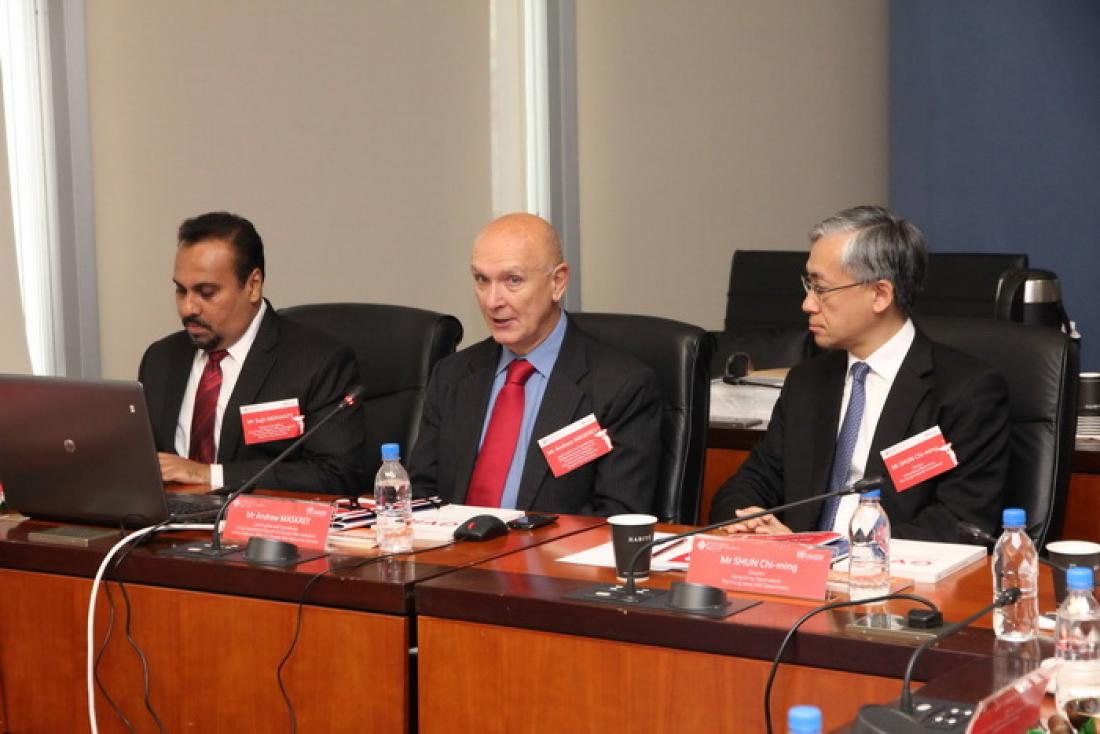Mr Andrew Maskrey (middle), Mr Sujit Mohanty (left) and Mr Shun Chi-ming (right) shared the views on disaster risk reduction.
The Hong Kong Polytechnic University (PolyU) and The United Nations Office for Disaster Risk Reduction (UNISDR) jointly organised the launch of the Global Assessment Report 2015 (GAR15) and the dialogue on the implementation of the Sendai Framework (2015-2030) for the first time in Hong Kong on PolyU campus on 2 December (Wednesday). The GAR15 reported that disaster risks have increased faster than they have been reduced. Although there is no major disaster in Hong Kong in recent years, it does not mean the city will not face any hazard in the next 50 years.
Officiating guests at the opening ceremony were Mr Andrew Maskrey, Lead Author and Coordinator of GAR15 from UNISDR in Geneva, Switzerland; Mr Sujit Mohanty, Programme Officer of the UNISDR Regional Office for Asia and the Pacific; Mr Shun Chi-ming, JP, Director of the Hong Kong Observatory; and Prof Angelina Yuen, PolyU's Vice President (Institutional Advancement and Partnership). Around 50 representatives of different stakeholder groups took part in this important launch and dialogue, including distinguished guests from the Hong Kong SAR Government, private and business sectors, NGOs, research & academics, as well as funding bodies and foundations.
United Nations' (UN) Global Assessment Report on Disaster Risk Reduction is a flagship biennial comprehensive review and analysis of global disaster risk as well as risk management. Titled "Making development sustainable: The future of disaster risk management," the GAR15 emphasizes that sustainable development can only be attained by reducing disaster risk through managing the risks inherent in social and economic activities. This is opposed to solely focusing on reducing disaster risk from natural disasters. The Sendai Framework was adopted by UN Member States on 18 March 2015, and it is a 15-year, voluntaryagreement which recognizes that the State has the primary role to reduce disaster risk but that responsibility should be shared with the other stakeholders.
In her opening remarks, Prof Angelina Yuen highlighted that "Hong Kong is not a city totally free from disaster risks, and therefore PolyU has an important role to play in disaster risk reduction and in the implementation of Sendai Framework. Through PolyU-UNISDR Collaboration Programme, a newly established cross-departmental and inter-disciplinary platform in which all Faculties and Schools in PolyU are involved with UNISDR, we aim to increase the risk awareness and resilience of Hong Kong people and nearby regions through collaborative research, public education and knowledge transfer."
Speaking at the occasion, Mr Shun Chi-ming said, "The Hong Kong Observatory is responsible for monitoring disaster risks and disseminating timely alert information, as well as to increase public awareness of disaster risks. We are keen to develop partnership with local and international organizations, and we appreciate very much and look forward to work with PolyU and UNISDR to make Hong Kong a more climate risk and disaster resilient city for the present and future generations."
In his overview of the GAR15, Mr Andrew Maskrey opined that countries with high ratio of Average Annual Loss to social expenditure, investment and capital stock will have difficulties in achieving their sustainable development goals. He emphasized that disaster risk management should shift from managing disasters to managing risks and it needs to be mainstreamed into a city's development. All stakeholders should work together to prevent and avoid new risks, reduce existing risks and strengthen social and economic resilience.
Mr Sujit Mohanty shared that all countries and stakeholders should focus on preventing new disaster risks and reducing existing disaster risks and strengthening their disaster resilience. The Sendai Framework calls for various measures to prevent and reduce hazard exposure and vulnerability, as well as to increase preparedness and recovery.
A panel discussion was held following the launch of GAR15 with the theme "Sustainable development cannot be achieved without successfully managing disaster and climate risk: The role of science, technology and business sector in managing disaster and climate risk, in line with the implementation of the Sendai Framework." Besides Mr Andrew Maskrey, the other panelists were Mr Edwin Lai, Assistant Director (Development, Research and Administration Branch) of the Hong Kong Observatory; Dr David Wong, Former Deputy Chief Executive of the Bank of China Group; Mr Stephen Lee, Assistant Director (New Buildings) of the Buildings Department; Prof Chau Kam-tim, Chair Professor of Geotechnical Engineering of PolyU's Department of Civil and Environmental Engineering. Further details of the panel discussion can be viewed at the following link: http://fhss.polyu.edu.hk/en/events/DRRR.html
*****
Press Contacts
Dr Timothy Sim
Director, PolyU-The United Nations Office for Disaster Risk Reduction Collaboration & Associate Professor, Department of Applied Social Sciences
Telephone: (852) 2766 5015
Email: [email protected]



